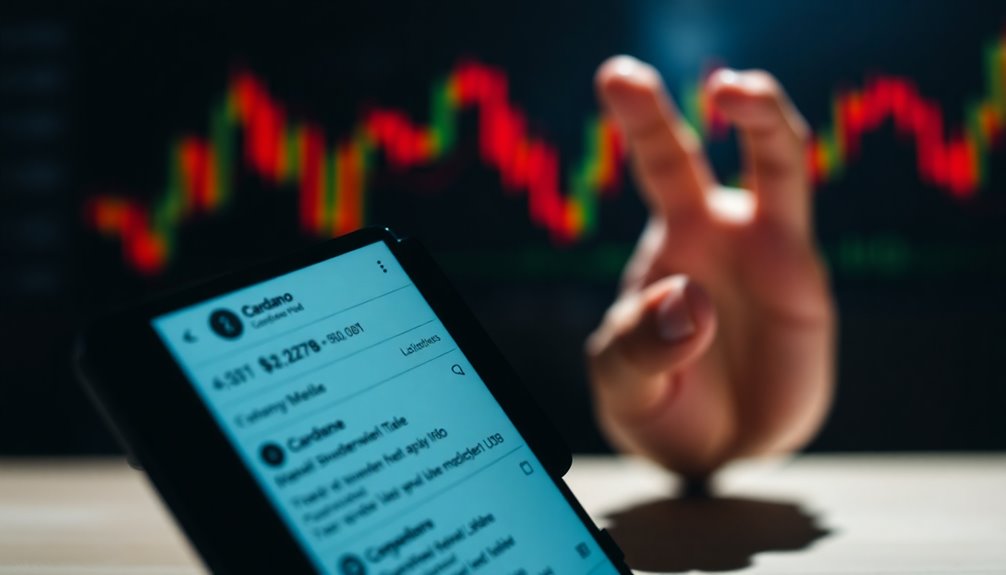It's as if the entire cryptocurrency world stopped to watch Cardano's founder, Charles Hoskinson, engage in a heated social media exchange with critics. You might wonder how he manages to balance defending his project while addressing the growing concerns over its development speed and transaction issues. Interestingly, a recent community poll shows that many still support Cardano despite the noise. So, what does this backlash mean for the future of Cardano, and how will it navigate the turbulent waters of regulatory scrutiny and market volatility?
Key Takeaways
- Cardano's founder, Charles Hoskinson, addressed criticisms about the project's development pace and low transaction throughput on social media.
- A recent poll indicated that 57.1% of the community disagreed with negative characterizations of Cardano, showcasing support for the project.
- Market volatility and external factors have recently affected Cardano's ADA price, causing fluctuations between $0.8628 and $0.9246.
- The project faces increasing regulatory scrutiny, emphasizing compliance measures like Atala Prism for KYC processes, which can enhance institutional trust.
- Strategic partnerships with companies like New Balance and Coinbase Custody focus on improving Cardano's technological capabilities and real-world applications.
Founder Responds to Backlash

As criticisms mount regarding Cardano's development pace and effectiveness, founder Charles Hoskinson has stepped up to address these concerns head-on.
He's acknowledged the low transaction throughput, emphasizing the need for improvement. When a bot humorously compared Cardano's timeline to a struggling Ph.D. student, Hoskinson defended the project's progress. In response to the ongoing debate, he highlighted that low TPS could be a significant factor in the project's challenges.
He also challenged critics to provide specific evidence about smart contracts' effectiveness. While some community members reacted by selling their ADA holdings, others grew more optimistic about Cardano's future.
Hoskinson faced personal attacks but received support from the Cardano community, with a poll revealing that 57.1% disagreed with negative characterizations of him.
This dialogue highlights the ongoing commitment to transparency and improvement within the Cardano ecosystem.
Regulatory Scrutiny Intensifies on Cardano

While Cardano continues to develop its ecosystem, the increasing regulatory scrutiny poses both challenges and opportunities for the platform. By aligning with the Markets in Crypto-Assets (MiCA) regulations, Cardano showcases its commitment to sustainability and consumer protection. Its adherence to Anti-Money Laundering measures and transparent governance enhances institutional trust. The decentralized identity solution, Atala Prism, supports necessary KYC processes, further solidifying its compliance stance. Additionally, Cardano's energy-efficient protocol and sustainability indicators align with Environmental, Social, and Governance (ESG) concerns, setting a benchmark in the industry. This commitment to energy efficiency is exemplified by its focus on renewable energy innovations, which is increasingly critical in today's market. As it navigates diverse global regulations, Cardano can leverage its developer community to ensure adaptability, positioning itself favorably in the evolving regulatory landscape. This proactive approach could ultimately strengthen its market position. Furthermore, with a current market cap of $32.47 billion(32.47 billion) and growing institutional interest, Cardano is well-equipped to face regulatory challenges.
Market Volatility and Price Fluctuations

Market volatility and price fluctuations in the cryptocurrency space can often feel unpredictable, especially when external factors influence investor sentiment. Positive news can send prices soaring, while negative reports can trigger rapid declines. You might notice how technological advancements or regulatory changes can drastically impact market dynamics, causing sudden price shifts. Investor behavior also plays a crucial role; fear, uncertainty, and doubt can lead to herd mentality, driving prices down quickly. Furthermore, supply and demand dynamics are essential—limited supply cryptocurrencies often see price increases as interest grows. With each new development or rumor circulating on social media, the market reacts, highlighting the importance of staying informed to navigate these turbulent waters effectively. Recently, the price of ADA fluctuated between $0.8628 and $0.9246, reflecting the current market's volatility.
Corporate Partnerships and Collaborations

Corporate partnerships and collaborations play a crucial role in Cardano's growth strategy, enabling the network to expand its ecosystem and enhance its technological capabilities.
For instance, partnerships with New Balance and Ergo focus on integrating blockchain into supply chain management and decentralized finance applications. Collaborations with Coinbase Custody and SingularityNET boost security and explore AI-driven applications, respectively. Additionally, partnerships with PwC provide advisory services for regulatory compliance, further strengthening Cardano's position in the market.
Moreover, initiatives like the EMURGO-Zilliqa collaboration enhance interoperability, while integration with BitcoinOS improves DeFi capabilities.
These strategic partnerships not only target real-world use cases but also emphasize technological advancements, such as modular blockchain technology and rigorous smart contract verification.
Collectively, these efforts position Cardano as a forward-thinking player in the blockchain landscape, poised for significant impact.
Lobbying Efforts in Cryptocurrency Regulations

As Cardano expands its ecosystem through strategic partnerships, it also faces a rapidly evolving regulatory landscape that demands attention.
The cryptocurrency industry is ramping up lobbying efforts, with spending hitting a record $131.91 million in 2023. Companies like Coinbase and Ripple Labs significantly increased their lobbying budgets, emphasizing the growing need for regulatory clarity. Notably, lobbying expenditures increased by 1,386% since 2017, showcasing the urgency for comprehensive regulations.
As the environment becomes more complex, firms aim to influence legislation that shapes digital assets. Recent congressional actions, including overturning an SEC bulletin, highlight the industry's impact on policy.
With financial entities joining the lobbying push, you can see how critical it's for the crypto sector to secure a favorable regulatory framework for its continued growth and stability.
Long-Term Scalability Strategies

While navigating the complexities of blockchain scalability, Cardano is implementing a range of long-term strategies designed to enhance its network's performance and efficiency.
One key focus is decentralized governance, using on-chain voting for transparent decision-making and a permanent committee for strategic continuity. The introduction of a decentralized constitution will further empower the community in governance processes.
Technological innovations, like the Hydra layer-2 scaling solution, improve transaction throughput while maintaining decentralization. You'll notice that transaction speeds are impressive, with aims to reach 1,000 transactions per second.
Moreover, Cardano prioritizes energy efficiency through its Ouroboros Proof of Stake algorithm, reducing environmental impact.
By 2025, workshops in 100 countries will further engage communities, promoting global adoption and tackling technical challenges.
These strategies position Cardano for sustainable growth and relevance in the blockchain ecosystem.
Frequently Asked Questions
What Are the Main Features of the Cardano Blockchain?
Cardano's blockchain has several key features you should know about.
It uses a two-layer architecture, separating transactions and smart contracts for efficiency. The Ouroboros consensus mechanism ensures secure transaction validation.
You can create smart contracts through a structured process, and it offers robust security with formal verification.
Its real-world applications include decentralized apps, supply chain management, and identity verification, making it versatile for various industries.
These features make Cardano a strong contender in the blockchain space.
How Does Cardano Compare to Other Cryptocurrencies?
Did you know Cardano processes around 250 transactions per second? When you compare it to Ethereum's 20-30, it's clear Cardano offers a more efficient option.
Using a Proof of Stake mechanism, it's energy-efficient and boasts lower, predictable fees.
While Ethereum has a mature smart contract ecosystem, Cardano's newer approach emphasizes security and real-world applications, making it a compelling choice for those focused on sustainability and innovative blockchain solutions.
Who Are the Key Team Members Behind Cardano?
When you look into Cardano, you'll find key team members driving its vision.
Charles Hoskinson leads IOG as CEO, while Frederik Gregaard heads the Cardano Foundation.
You'll also encounter Andreas Pletscher, the COO, and Giorgio Zinetti, the CTO, focusing on operations and technical strategies respectively.
Nicolas Jacquemart, the Chief Legal Officer, ensures legal compliance.
Together, they form a diverse team dedicated to advancing blockchain technology and decentralized governance.
What Is Cardano's Approach to Environmental Sustainability?
Think of Cardano as a green lighthouse in a stormy sea of blockchain energy consumption.
Its approach to environmental sustainability shines through with its Proof of Stake mechanism, drastically cutting energy use to just 0.5 GWh annually.
By supporting eco-friendly projects and collaborating on sustainable technologies, Cardano minimizes its carbon footprint, setting a benchmark in the industry.
This commitment to ethical leadership and transparency fosters a more responsible blockchain ecosystem you can trust.
How Can I Buy Cardano (ADA) Tokens?
You can buy Cardano (ADA) tokens through several methods.
Start by opening an account with a brokerage for a quick and easy purchase.
Alternatively, use a centralized exchange to trade fiat currency for ADA, keeping in mind the KYC requirements.
If you're feeling adventurous, try a decentralized exchange for a more hands-on approach.
Lastly, consider using a hardware wallet for secure storage after buying your tokens on an exchange.
Enjoy your investment journey!
Conclusion
In the face of criticism, Charles Hoskinson stands firm, defending Cardano's vision and progress. While regulatory scrutiny looms and market volatility persists, the community's support remains strong, echoing a commitment to innovation. As partnerships grow and lobbying efforts intensify, Cardano is poised to navigate challenges and embrace opportunities. By focusing on long-term scalability and addressing concerns head-on, Cardano aims not just to survive but to thrive, proving that resilience and dedication can pave the way to success.









